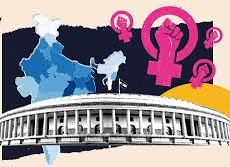Empowering Women in Politics: The Need for the Women’s Reservation Bill

Introduction
In the realm of politics, women have been historically underrepresented and marginalized. Despite making up roughly half of the world’s population, their presence in legislative bodies around the world remains disproportionately low. The Women’s Reservation Bill, a proposed piece of legislation in India, seeks to address this imbalance by reserving a certain percentage of seats in parliament and state legislatures for women. In this blog, we will delve into the importance of the Women’s Reservation Bill, its history, and the arguments for and against its implementation.
The Historical Context of Women Empowerment
The underrepresentation of women in politics is a global issue, and India is no exception. Throughout history, women have faced significant obstacles when trying to enter the political arena. Patriarchal norms, cultural biases, and societal expectations have hindered their participation. To combat this, India introduced the Women’s Reservation Bill in 1996, aiming to reserve one-third of seats in the Lok Sabha (the lower house of parliament) and state legislative assemblies for women.

The Importance of Women’s Representation
- Gender Equality: The Women’s Reservation Bill is a crucial step toward achieving gender equality in politics. It acknowledges that women have the same rights and capabilities as men to participate in the governance of their country.
- Diverse Perspectives: Women bring unique perspectives to political decision-making. Their experiences, concerns, and priorities often differ from those of men. Increasing women’s representation can lead to more comprehensive and inclusive policies.
- Role Models: Women in positions of power serve as role models for future generations. When girls see women in leadership roles, it inspires them to pursue their ambitions and break down gender stereotypes.
Arguments in Favor of the Bill
- Rectifying Historical Injustice: The underrepresentation of women in politics is a historical injustice that needs to be rectified. The Women’s Reservation Bill can help correct this imbalance.
- Improved Governance: Studies show that increased gender diversity in legislatures leads to better governance. Women tend to focus on issues such as education, healthcare, and social welfare, which can lead to improved overall development.
- Legal Framework: The Bill provides a legal framework to ensure that women have a fair opportunity to participate in politics. It can help break the cycle of exclusion and discrimination.

Arguments Against the Bill – Women’s Empowerment
- Tokenism: Some opponents argue that reserving seats for women may lead to tokenism, where women are elected not on their merits but simply to fill the quota. This, they argue, could weaken the quality of representation.
- Political Parties’ Resistance: Political parties may resist the Bill as it could disrupt existing power structures within the parties and affect their ability to field candidates of their choice.
- Social Change vs. Legal Mandate: Critics suggest that true gender equality should come from social change rather than a legal mandate. They argue that society should evolve naturally, allowing women to enter politics without quotas.
Conclusion
The Women’s Reservation Bill is a contentious yet essential piece of legislation aimed at addressing the historical underrepresentation of women in Indian politics. While it has faced opposition and challenges, its importance in achieving gender equality and better governance cannot be denied. By providing a legal framework for women’s participation, the Bill takes a significant step toward rectifying the gender imbalance in politics. As India and the world strive for greater equality, the Women’s Reservation Bill stands as a symbol of progress and a commitment to empowering women in all spheres of life.
Women empowerment is crucial in India for several reasons:
-
Gender Equality: Women make up roughly half of India’s population, and achieving gender equality is a fundamental human right. Empowering women ensures that they have the same opportunities, rights, and access to resources as men.
-
Economic Growth: Empowered women can contribute significantly to the economy by participating in the workforce. When women are educated and financially independent, they can make a substantial contribution to household income and national GDP.
-
Education: Investing in women’s education is a powerful way to empower them. Educated women are more likely to make informed decisions about their lives, healthcare, and family planning, leading to better overall well-being.
-
Health and Family Welfare: Empowering women often leads to improved health outcomes for themselves and their families. When women have access to healthcare information and services, maternal and child mortality rates tend to decrease.
-
Social Development: Women play a vital role in social and community development. Empowered women can advocate for their rights, challenge social norms that perpetuate discrimination, and contribute to positive changes in society.
-
Political Representation: Encouraging women’s participation in politics and decision-making processes is essential for a well-rounded democracy. It ensures that policies and laws are more inclusive and representative of the entire population.
-
Reduction in Gender-Based Violence: Empowered women are more likely to resist and report gender-based violence. Promoting women’s rights and equality can help reduce incidents of violence against women.
-
Poverty Alleviation: Empowering women by providing them with economic opportunities can help lift families and communities out of poverty. Women tend to invest a significant portion of their earnings in their children’s education and well-being.
- National Development: Women’s empowerment is closely linked to overall national development. It leads to a more skilled and productive workforce, reduces poverty, and enhances the country’s global competitiveness.
In India, despite significant progress, there are still challenges related to gender inequality, such as unequal access to education, economic opportunities, and political representation. Therefore, women’s empowerment remains a critical objective for achieving social justice, economic growth, and overall development in the country.
